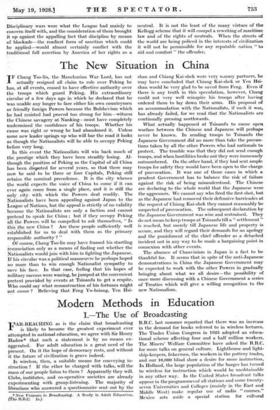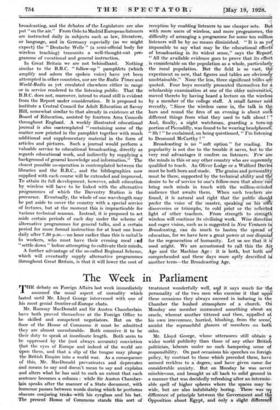Modern Methods in Education
I.—The Use of Broadcasting
FAR-REACHING as is the claim that broadcasting is likely to become the greatest experiment ever attempted in national education, we agree with Sir. Henry Hadow* that such a statement is by no means ex- aggerated. For adult education is a great need of the present. On it the hope of democracy rests, and without it the future of civilization is grave indeed.
Is wireless, then, a suitable means for conveying in- struction ? If the ether be charged with talks, will the mass of our people listen to them ? Apparently they will. Clubs, institutes, and co-operative societies are already expeiimenting with group-listening. The majority of librarians who answered a questionnaire sent out by the *New Ventures in Broadenatipg. A Study is Adult Education. efhe B.B.O. B.B.C. last summer reported that -there was an increase in the demand for books referred to in wireless lectures. The Trades Union Congress in 1925 adopted an educa- tional scheme affecting four and a half million workers. The Miners' Welfare. Committee have asked the B.B.C. for more talks on general culture. Lighthouse and light- ship-keepers, fishermen, the workers in the pottery trades, and our 10,000 blind show .a desire for more instruction. In Holland, the large population of the barges has turned to wireless for instruction which would be unobtainable in any other way. In the United States broadcast talks appear in the programmes of all stations and some twenty- seven Universities and Colleges (mainly in the East and Middle West) make regular use of radio . " courses." Mexico sets aside a special station for cultural broadcasting, and the debates of the Legislature are also put " on the air." From Oslo to MadridEuropean listeners are instructed daily in subjects such as law; literature, or language, and in Germany especially (as we might expect) the " Deutsche Welle " (a semi-official body for wireless teaching). transmits a well-thought-out pre.- gramme of vocational and general instruction.
In Great Britain we are not behindhafid. Nothing similar to the B.B.C. " follow-up " pamphlets (whieh amplify and adorn the spoken voice) have yet been attempted in other countries, nor are the Radio Times and World-Radio as yet emulated elsewhere either in range or in service rendered to the listening public. That the B.B.C. does not, moreover, intend to stand still is evident from the Report under consideration. It is proposed to institute a Central -Council for Adult Education at Savoy Hill, somewhat similar to that already in existence at the Board of Education, assisted-by fourteen Area Councils throughout Engladd. A weekly illustrated educational journal is alSo contemplated " containing some of the matter now printed in the pamphlet together with much additional and supplementary material in the form of articles and pictures. Such a journal would perform a valuable service to educational broadcasting, directly as regards edueational work, and indirectly by supplying a background of general knowledge and information." The closest possible co-operation is contemplated between the libraries and the B.B.C., and the bibliographies now supplied with each course will be extended and improved. To attain its full deVelopment, however, adult education by. wireless will have to be linked with the alternative programmes of which the Daventry Station is the precursor. Eventually, the whole of one wavelength may be put aside to cover the country with, a. special service of lectures, but at the moment this is impracticable for Various technical reasons. Instead, it is proposed to set aside certain periods of each day under the scheme of alternative programmes for general talks, and a certain period for more formal instruction for at least one hour daily after 7.80 p.m.-7no-hour earlier than this is snail' le o workers, who must have their evening meal fad " settle down " before attempting to cultivate their minds.
A further advantage of the so-called Regional Scheme, which will eventually supply alternative programmes throughout Great Britain, is that it will lower the cost of reception by enabling listeners tp use cheaper sets. But with more users of wireless, and more programmes, the difficulty of arranging a programme for some ten million listeners will be by no means diminished. "'It is as yefi impossible' to say what may be the educational effeeth of broadcasting in its WideSt. sense," says the Report: " All the available evidence goes to prove that its effect is eorisiderable on the population as a whole, particularly, the rural population. But the field is so vast, the experiment so new, that figures and tables are obviousti unobtainable." None the less, three significant trifles a quoted. Four boys recently presented themselies for it scholarship "examination at one of the Older UniVersitiei: moved thereto by having heard a lecture on the wirelesi by a member of the college staff. A small farMer said recently, ". Since the wireless came in, the talk in the bars and round the fires of an evening is about sifell different things from what they used to talk about !I And, finally, a night watchman, guarding - a •tOrnoi) portion of Piccadilly, was found to be wearing headphone'. " Sh ! " he exclaimed, on being qUestioried, " I'm listening to Desmond McCarthy ! " • Broadcasting is no' " soft Optioh " for reading. Its popularity is not due to the trouble it saves, but to the Very real advantages it confers On 'Feiv- are the minds in this or any other country who are supremely qualified to-teach. - An 'Oliver Lodge or a WalfOrd•DaVie4 must be both born and made: The genius and personality must be there, supported -by the techhieal abilitsrand ti desire to be of service to one's fellow-men that alone chit bring such minds in touch with the million-Minded audience that awaits them.'When teachers are tound; it is natural and right. that • the public' Should Prefer the Voice ' Of the 'master, speaking on 'VS Iiid` discoVeries or triumphs,' to cold print' or the- kelie'et41 light of Other' teachers. From Streritth • to strength wireless will continue its 'civilizing Work: WiSe directrcui and eager vision, such as is suggeited in New Ventures irr Broadcasting, 'can do much to' hasten "the spread' of education; for we haVe here -a great po*er at our 'disposal for the regeneration of humanity. Let us see that it i‘ used aright. We are accustomed to call this- the Aii Age and the Machine Age : it is' both,' but both are cOmpreherided and these days more aptly described iri another terrii—the Broadcasting Age. '



































 Previous page
Previous page